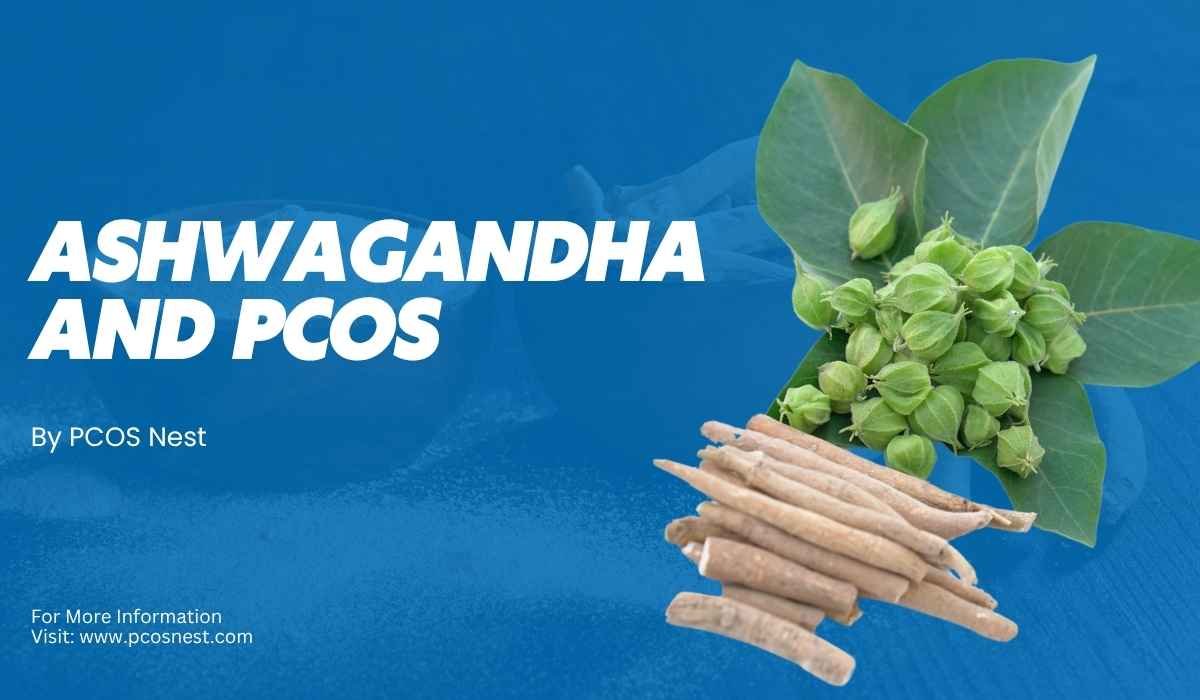What is Ashwagandha?
Ashwagandha is an adaptogenic herb traditionally used in Ayurvedic medicine. It is renowned for its ability to help the body manage stress and has been studied for various health benefits, including hormonal balance and metabolic support.

Composition of Ashwagandha:
The therapeutic effects of Ashwagandha are attributed to its bioactive compounds:
- Withanolides: Steroidal lactones with anti-inflammatory and hormone-modulating properties.
- Alkaloids: Compounds that may influence neurotransmitter activity.
- Saponins: Known for their antioxidant effects.
- Iron: Essential for various bodily functions, including oxygen transport.
These constituents contribute to Ashwagandha’s adaptogenic, anti-inflammatory, and antioxidant activities.
Also Read: Berberine Benefits For PCOS
Ashwagandha and PCOS:
1. Stress Reduction and Cortisol Modulation
Chronic stress can exacerbate PCOS symptoms by increasing cortisol levels and cause hormonal imbalances.
“Ashwagandha is primarily known for its adaptogenic properties, which help regulate the body’s response to stress. It supports the function of the adrenal glands, which produce stress hormones like cortisol.”
2. Improvement in Insulin Sensitivity:
Insulin resistance is a common feature of PCOS. Ashwagandha may enhance insulin sensitivity, aiding in blood sugar regulation and reducing the risk of type 2 diabetes.
“Ashwagandha may help alleviate some of the hormonal imbalances associated with PCOS by improving insulin sensitivity.”
3. Hormonal Balance:
“Ashwagandha has also been shown to modulate endocrine function, particularly the balance of cortisol, thyroid hormones, and androgens.”
This is particularly relevant for PCOS, where elevated androgen levels can lead to symptoms like acne and irregular menstrual cycles.
4. Mood Enhancement:
Women with PCOS often experience mood swings, depression, and anxiety.
“Ashwagandha has been shown to have anti-anxiety and anti-depressant effects, which can help improve mental well-being.”

Side Effects and Precautions:
While Ashwagandha is generally considered safe, some individuals may experience:
Gastrointestinal discomfort: Such as nausea or diarrhea.
Drowsiness: Especially at higher doses.
Thyroid stimulation: Caution is advised for individuals with hyperthyroidism or those on thyroid medications. Ashwagandha can be a thyroid-supporting herb, but only in hypothyroid or normal thyroid cases. If there’s overactive thyroid or you’re unsure about your levels, it’s best to check your TSH, T3, and T4 through lab tests. And make sure to discuss it with an endocrinologist or doctor.
It’s important to consult a healthcare provider before starting Ashwagandha, particularly if you have existing health conditions or are taking other medications.
Here’s a visual comparison chart to help you understand how Ashwagandha interacts with different thyroid conditions, especially in women with PCOS:
Ashwagandha vs. Thyroid Conditions (PCOS Context):
| Thyroid Condition | Effect of Ashwagandha | Safe to Use? | Why? |
| Subclinical Hypothyroid | ✅ May increase T3/T4 naturally | ✔️ Yes | Helps normalize hormone levels and supports metabolism |
| Mild Hypothyroidism | ✅ Boosts thyroid function | ✔️ Yes (with monitoring) | May reduce fatigue, improve mood and metabolism |
| Normal Thyroid | ⚠️ Mild stimulation possible | ✔️ Yes (low dose) | Generally safe, but watch for hyperthyroid symptoms |
| Hyperthyroidism | ❌ May worsen symptoms | ❌ No | Can overstimulate thyroid and cause anxiety, palpitations, insomnia |
| Thyroid Autoimmune (Hashimoto’s) | ⚠️ May be helpful but controversial | ❓ Maybe | Needs medical advice—some studies show benefit, others caution |
Recommended Dosage:
Ashwagandha is available in various forms, including capsules, powders, and liquid extracts. Dosage recommendations vary based on the form and concentration:
- Standardized extract (with 5% withanolides): 300–500 mg, taken once or twice daily.
- General range: 300 mg to 1,000 mg per serving.
It’s advisable to start with a lower dose to assess tolerance and gradually increase as needed, under professional guidance.
“It is often sold in concentrations ranging from 300 mg to 1,000 mg per serving, with recommended dosages generally around 300–500 mg taken once or twice daily.”
| Aspect | Details |
| Primary Benefits | Stress reduction, insulin sensitivity, hormonal balance, mood support |
| Key Compounds | Withanolides, alkaloids, saponins, iron |
| Dosage | 300–500 mg standardized extract, once or twice daily |
| Potential Side Effects | Gastrointestinal discomfort, drowsiness, thyroid stimulation |
| Precautions | Consult healthcare provider if pregnant, breastfeeding, or on medication |
Frequently Asked Questions:
Should people with PCOS take ashwagandha?
Ashwagandha may help women with PCOS by reducing cortisol, improving insulin sensitivity and supporting mild hypothyroidism (300–500 mg of a ≥5% withanolide extract once or twice daily).
However, there are no large PCOS‑specific trials, so benefits are inferred from stress, metabolic and thyroid studies.
It’s generally well tolerated but can stimulate thyroid hormone production, avoid if you have overt hyperthyroidism.
Does ashwagandha stop periods?
No, there’s no clinical evidence that Ashwagandha “stops” menstruation. In fact, adaptogenic doses (300–600 mg/day) have been shown to regulate cycles by balancing FSH, LH and cortisol, improving menstrual regularity in women with stress‑related irregularities. Anecdotal reports of delayed periods exist, but no controlled trials confirm a direct suppressive effect.
Are there negative side effects of ashwagandha?
Commonly reported adverse effects (usually mild) include gastrointestinal upset (nausea, diarrhea, vomiting), drowsiness or sedation, headache, and occasional gastritis.
Rare cases of herb‑induced liver injury have been linked to Ashwagandha supplements, especially in those with preexisting liver conditions.
Conclusion:
Ashwagandha offers multiple benefits that may help manage PCOS symptoms, particularly through stress reduction, hormonal balance, and improved insulin sensitivity. However, individual responses can vary, and it’s essential to consult with a healthcare professional before incorporating Ashwagandha into your diet.

